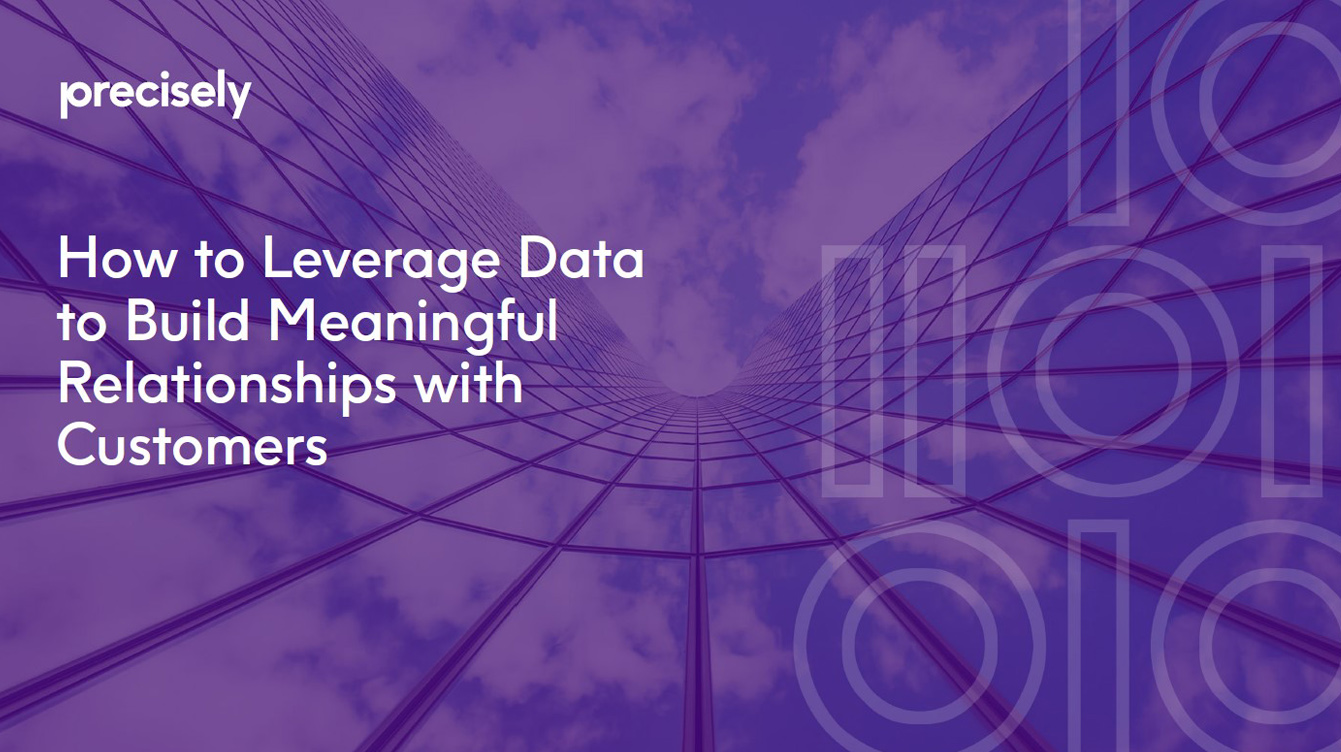eBook
How to Leverage Data to Build Meaningful Relationships with Customers
Succeeding in today’s competitive global marketplace begins with understanding that consumers don’t just buy products–they buy experiences. To create the kind of experiences that keep them coming back, businesses need to engage with their customers on a deeper level, anticipating their needs and personalizing both what is being offered and the way those offers are communicated.
Accomplishing that depends on an understanding of the customer’s behaviors, intentions, and goals. It means mastering personalization and applying it at scale: Recognizing each individual; being aware of their previous interactions with your company; and ensuring each touchpoint and communication is focused on the things that matter to them.
The rewards of doing so are significant.
of customers are willing to spend more when companies provide personalized customer services.

Data is the Foundation
Your ability to build meaningful relationships with your customers depends completely on data and the knowledge and insights you can derive from it. While customer data provides the essential building blocks, effective personalization happens only if your data is accurate, consistent, and contextual.
Yet many organizations struggle to execute these objectives. In the 2025 Outlook: Data Integrity Trends & Insights report, published in partnership with the Center for Applied AI and Business Analytics at Drexel University’s LeBow College of Business, we found that 67% of companies don’t completely trust the data used by their organization for decision-making.
So, it is time to commit to achieving data integrity and investing in solutions that enable your businesses to build meaningful relationships and outstanding customer experiences.


Data Integrity
Achieving data-driven personalization at scale starts with ensuring that your customer data is fit for the task at hand and readily available to the people and systems that need it, in formats they can use. It also requires businesses have the tools and skills to apply it effectively and derive reliable, actionable customer experience insights from it.
In other words, your data must have integrity. Data Integrity means that data is accurate, consistent, and contextual wherever and whenever it’s needed. Data with integrity is trustworthy and empowers fast, confident decisions that help you add, grow, and retain customers, move quickly and reduce costs, and manage risk.
In contrast, poor data quality, insufficient data governance, outdated information, and inconsistent, siloed access are all hallmarks of low integrity data.
Furthermore, low-integrity data lacks information that frames it for real world use. For instance, you may have an accurate database of customer names and addresses. Still, if you do not have supporting data that gives you context about the history of those customers’ interactions with your company, your database will be much less useful for building meaningful relationships.
Data Quality Challenges
The most common causes of low-integrity data stem from poor data quality. Examples include:
- Missing data: Blank fields that should have values
- Format errors: Hyphens in a credit card number, “USA” instead of “United States”
- Conflicting records: Same house number, street, city, and state, but different postal codes
- Invalid data: Date of birth in the future; e-mail domain extension does not exist (customer@xyz.mail)
Invalid data can lead to severe and costly results, including inconsistent or unpleasant customer experiences that lead to damaged relationships, lost revenue, and diminished brand loyalty. Customers notice when their name is incorrect in a ‘personalized’ email, or when they’re sent product recommendations for items unrelated to their previous purchases.
No matter how good your customer communications systems are, low-integrity data can cripple any effort to build brand credibility and customer loyalty.
64%
say data quality is the top challenge to the integrity of their data
Precisely-Lebow-Report-2024
DATA QUALITY AND GOVERNANCE

Leveraging High-Quality Data for Personalized Communication
We all respond much more positively when we receive communications that are not just targeted at customers like us, but are instead fully personalized for us, with specific information, offers, and responses that fit perfectly within the conversation we are having with that specific company at that exact moment.
Years of surveys and research conducted by major consulting firms and market leaders have consistently proven that effective real-time personalization yields quantifiable financial and brand-value results. Everything from Net Promoter Scores to lifetime customer value, increased average revenue per order, lower cart abandonment rates… by every metric, companies are rewarded for their commitment to personalized customer engagement.
Delivering this level of personalization is challenging and achieving it at scale is nearly impossible without high-integrity customer data and advanced customer communications solutions. To succeed, you need a solution that allows you to gather, analyze, and leverage data, ensuring personalized communications that resonate with your audience. Survey data from consulting firm McKinsey found that 67 percent of companies admit that they do not have the correct tools in place to execute personalization at scale.
“We all respond much more positively when we receive communications that are not just targeted at customers like us, but are instead fully personalized for us.”
Integration and Analytics
The best Customer Communication solutions today excel at integrating existing systems and capabilities, enabling companies to build upon what they already have while adding new, powerful capabilities for personalization at scale.
Measuring and Optimizing Results
Every successful company understands the value of measuring key results and adjusting business processes for performance improvements. Even simple indicators like Net Promoter Score (NPS) and Customer Satisfaction (CSAT) provide important value when viewed as trends across many periods.
Without question, ongoing tracking, reporting, and analysis of results are essential for continuous improvement. And even greater insights can be obtained when this discipline is applied to vast volumes of data being collected and generated by a customer communications solution. The right solution will store and centralize customer interactions and communication data, enabling businesses to leverage advanced analytics for insights. By analyzing this data, businesses can optimize their interactions to deliver exceptional customer experiences.
While the specific data captured and the metrics being tracked are different for each communication type (i.e. email opens, video views, chatbot issues resolved, SMS delivers, etc.), the user interface for analytics and reporting tools is consistent and integrated across every channel and every functional area of your business. As a result, business leaders across the enterprise can compare and discuss shared results, developing plans for improvements and new initiatives.

It’s not that companies lack data about customers. Rather, they lack the tools, programs and integration needed to achieve data integrity. Customer data must be accurate, consistent, and contextual to be trusted for enterprise-scale omnichannel customer experiences.
Personalization Drives Meaningful Relationships
Consumers today expect to be treated as individuals. They expect to be able to interact with your company at any time, using whatever digital channel or device they prefer, and still receive the same highly personalized service. Though challenging, achieving this kind of personalization is central to building meaningful customer relationships; the kind of engagement that leads to more frequent and positive touches, stronger brand loyalty, and improved sales.
Deep personalization at scale requires a structured approach to collecting, managing, and analyzing customer data, while ensuring the highest levels of data integrity are maintained at all times. And to ensure that you stay “in synch” with your customers as your relationship evolves, it also requires continually measuring and assessing results, and then making adjustments to further optimize your methods and tactics.
While data is the foundation for personalization, your ability to effectively leverage it relies on a robust customer communication solution that can ensure the consistent delivery of personalized experiences across all content types, channels, devices, and methods of access.

Get in touch with Precisely to discover how we can help you leverage high-quality data for personalization that fosters stronger, more meaningful customer relationships.
Reference sources
Page 1 reference sources
https://www.precisely.com/blog/ces/customer-experience-strategiesmanaging-the-customer-communications-lifecycle
https://www.precisely.com/blog/data-quality/good-datamanagement-happy-customers
https://www.precisely.com/blog/data-quality/5-characteristics-ofdata-quality
Page 3 reference sources
https://useinsider.com/personalization-at-scale/
https://www.precisely.com/blog/data-quality/good-data-management-happy-customers
https://www.precisely.com/blog/ces/customer-engagement-trends-for-2024
IBM WP – The 5 pillars of personalization at scale
Page 4 reference sources
https://www.precisely.com/product/engageone-communicate/engageone-communicate
Read the full eBook